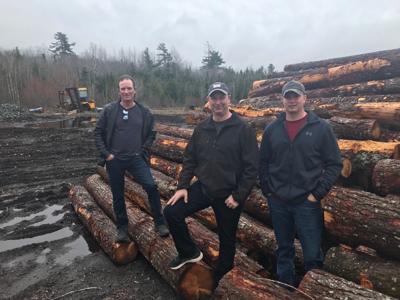Saw mill operators bemoan loss of pulp mill’s saw log supply
- Steve Goodwin
- May 4, 2022

David Wilson, from left, stands with David Emery and Emery’s son, Lorne Emery, at Dave’s Lumber near Central West River. The vacant background used to be covered with the hemlock logs they are standing on.
Local saw mill operators want the return of a steady and ample supply of saw logs that they’ve lacked since Northern Pulp closed.
“It’s very slow,” said David Emery of Dave’s Lumber, based in Salt Springs. “I can’t get enough wood. I usually operated nine or 10 months a year. I produced only seven months last year, and I’m already a month behind this year.”
He said his volume is a third of what it was when the pulp mill was operating.
Hemlock became a special wood product for Emery, who said Northern Pulp paid a satisfactory price for hemlock pulp.
“It was a niche thing,” he said. “I didn’t have a lot of competition. I did everything – 10x10, 1x3. People used it for garden boxes, camps and sheds.”
He said he regrets the loss of the local pulp market that made woodlot harvesting less viable.
“There’s no one to buy low-grade pulp,” he said. “It was one of our main (products) and we don’t have it. It’s nice to get everything you can out of a tree.”
Distance is hugely impactful on Emery’s business, he said. Transporting wood products to the pulp mill in Abercrombie costs far less than it would to haul it to Port Hawkesbury Paper, and the fuel prices have risen sharply.
“It was bad, but now it’s worse,” he said.
It has had consequences for Emery’s son, Lorne Emery, who has become employed elsewhere when it appeared the saw mill was unlikely to return to the production level it enjoyed when Northern Pulp was operating.
Eric Williams operates the family-owned Williams Brothers Lumber in Barney’s River. He had dealt with Northern Pulp since 1978, while his parents dealt with the pulp mill from when it opened. He said the saw mill business has declined over the past three years since the mill closed. He said he wishes government and business could solve the dilemma over forestry and the mill’s shutdown after the Boat Harbour effluent treatment facility closed on schedule.
“My main problem is the decision,” he said. “If we can put a person on the moon, we should be able to find a solution.”
Insecure wood supplies have halted the operation, and one of the casualties is the workforce.
“We lose workers who don’t come back,” he said.
Williams agreed with Avery regarding Northern Pulp’s central location that was closer to their operation.
“With Northern Pulp, we got a better price and we were not travelling as far,” he said.
Earle Miller is a woodlot owner and wood broker based in Lower Onslow. He’s most concerned with the smaller sawmill operations’ ability to operate successfully.
“I really feel for the smaller operators especially,” he said. “They’re in tougher than the big ones.”
Miller said he’s noticed less wood being cut because woodland was more accessible when the pulp mill operated and the mill accepted the softwood varieties that accompanied what the sawmills needed for saw logs.
He cited balsam fir as an example, a tree with limited use and a short life expectancy.
George Chisholm, who operates a saw mill on Loganville Road in western Pictou County, echoed calls for a solution and expressed regret to the short wood supply.
“It would be nice for them to figure something out over there,” he said, referring to the mill. “It’s hard to keep up when you can’t get logs.”
Meanwhile, Gerald Battist of Gerald Battist Trucking Ltd., said forestry and the general economy will worsen. He criticized the provincial government’s lack of dialogue with the mill.
“It’s not a good situation,” he said. “(Northern Pulp) was one of the top employers in the region. Before the end of the year, we’ll see saw mills shut down.”
He shared the impact the mill closing has had on his operation.
“We had 32 trucks going and we’re down to 21,” he said. “We haven’t seen yet how bad it’s going to be.”